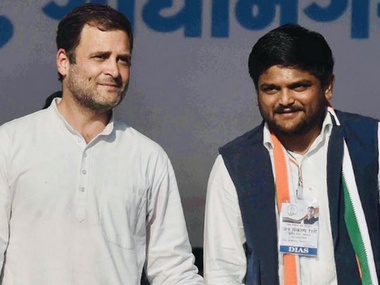On 12 March, Patidar leader Hardik Patel joined the Congress in the presence of its president Rahul Gandhi and was all set for his electoral debut. It was in July last year only that Patel became eligible to contest elections. He wanted to try his luck from the Jamnagar Lok Sabha constituency in Gujarat. However, less than a year after becoming eligible, he has become ineligible,
by the stroke of a court order . The Gujarat High Court on Friday rejected Patel’s plea seeking a stay on his conviction in the 2015 Mehsana rioting case. While the court order has belied the hopes of the young leader, the credit for scuttling his chances should also be given to Congress president Rahul Gandhi. Reason for Patel’s disqualification Section 147 of Indian Penal code that specifies the punishment for rioting, reads, “Whoever is guilty of rioting, shall be punished with imprisonment of either description for a term which may extend to two years, or with fine, or with both.” Patel was accused and faced trial under Section 146 of the IPC that states, “Whenever force or violence is used by an unlawful assembly, or by any member thereof, in prosecution of the common object of such assembly, every member of such assembly is guilty of the offence of rioting.” In July last year, a sessions court found Patel guilty under Section 146 of the IPC and apart from imposing a fine of Rs 50,000, sentenced him to jail for two years. Patel had filed an appeal in the Gujarat High Court against his conviction. Now with high court upholding the sentence, all hopes the Congress had of fielding Patel in the upcoming Lok Sabha election has ended. The high court, while rejecting the plea, had considered the past antecedents of Patel who shot to the limelight during the Patidar reservation agitation that took place in 2015. Seventeen FIRs have been registered against him in different criminal cases. [caption id=“attachment_6248131” align=“alignleft” width=“380”] Patidar leader Hardik Patel joined the Congress on 12 March in Gujarat. Twitter @HardikPatel_[/caption] Supreme Court judgment of 2013 In 2013 the Supreme Court, in a landmark judgment, struck down a provision in the electoral law that protects a convicted lawmaker from disqualification on the ground of pendency of appeal in higher courts. Under Sec 8(3) of the Representation of the People Act (RPA), a person convicted of any offence and sentenced to imprisonment for no less than two years, shall be disqualified for that and a further six years after release. However, another section that protected the convicted politician was 8(4) that said that a lawmaker cannot be disqualified for three months from the conviction, if in that period, he or she files an appeal against its disposal by a higher court. This section was struck down by the apex court. “The only question is about the vires of section 8(4) of the RPA and we hold that it is ultra vires and that the disqualification takes place from the date of conviction,” the bench comprising Justices AK Patnaik and SJ Mukhopadhaya observed while delivering the judgment. Rahul Gandhi’s role The
Ordinance that Rahul trashed would have insulated Patel from disqualification. It is worth recalling that following the apex court judgment, then UPA government decided to bring in the ordinance to nullify the apex court order. However, then Congress vice-president Rahul Gandhi, in an extremely dramatic gesture, castigated the Ordinance and tore it apart at a press conference, while then prime minister Manmohan Singh was on a tour to Washington. Now with the conviction, Patel has not only lost the chance to contest the upcoming Lok Sabha elections, but also the next Lok Sabha and the next Gujarat Assembly elections. The reason for this is that under Section 8(3) of the RPA, a person convicted of any offence and sentenced to imprisonment for not less than two years shall be disqualified for that and a further six years after release. So now if Patel goes on to compete his jail sentence, that is two years, unless the conviction is suspended by the apex court in due course as he files appeal, he will be out of jail only in 2021, And it is only six years after that, that is in 2027 that he will be allowed to contest elections. For any aspiring politicians who had just began his career, to lose eight years, looks like the end of the road. The only hope for Patel now is the Supreme Court. But that can only ensure his prospects in the next Gujarat Assembly elections and the 2024 General Election. For the upcoming Lok Sabha election, his fate is sealed.
On 12 March, Patidar leader Hardik Patel joined the Congress in the presence of its president Rahul Gandhi and was all set for his electoral debut
Advertisement
End of Article


)
)
)
)
)
)
)
)
)



